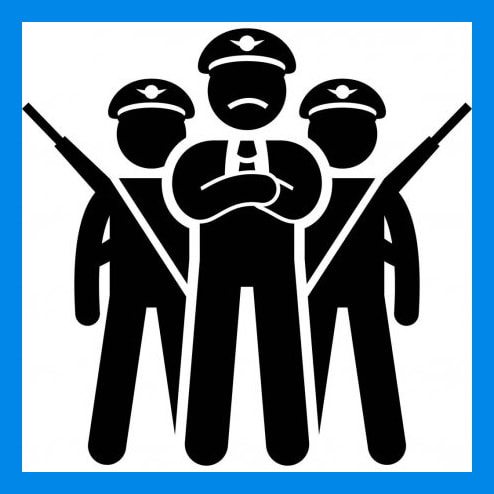|
On Wednesday 26 August, Thai Prime Minister Prayut Chan-o-cha warned, “…just wait, everybody will be on fiery land, engulfed in flames,” if student protests keep going. He was responding to a month of entirely peaceful student rallies protesting his authoritarian regime. So far the action his government has undertaken is to arrest a few young speakers (since the student movement does not have an identifiable leader). The government has also resorted to banning more than 1024 anti-government URLs online, including Facebook. Facebook has declared it will use its considerable resources to fight this.
How this is going to lead to the nation in flames is impossible to imagine unless the PM sends out his military incendiaries. Just a few hours earlier Belarus’s President, Alexander Lukashenko, wielded an assault rifle as he arrived in Minsk by helicopter with his 15-year old son in battle gear and also carrying an automatic weapon. It was a photo-op moment. Lukashenko recently “won” a “fixed election” having banned or jailed all viable opposition candidates to insure continuation of his quarter-century reign. People began to protest, with a Sunday rally on August 16 drawing 100,000 peaceful participants, a historic amount up to that time. Lukashenko warned his people not to do that again. Anyone joining an opposition protest against the election results would be treated as a terrorist. “We will wring their necks, as one might a duck.” Apparently the Belarus citizenry was not intimidated. The next Sunday more than 200,000 people came to the rally. That would have been a lot of necks to wring. The military resorted to playing martial music and making demands that the crowd go home. The crowd drowned out the music with chants for Lukashenko to resign. They went home at 6 p.m. as they had planned to do, cleaning up their own debris as they left. Such order by such a large crowd makes it hard for an authoritarian to hit back. Those were two incidents this week of authoritarian rulers threatening their own citizens. So far the threats have not led to violence on any large scale. That has not been the case everywhere in the world, as we know unless we’ve been living in a cocoon for the past decade. The authoritarian(s) in the USA have sent armed troops (actually “mercenaries” is the accurate term) against protestors in Portland and several other cities. Hong Kong has now succumbed to the same martial order as the rest of China, following unsuccessful police action against citizen protest rallies. In the Philippines, President Duterte is continuing his war of threats against various segments of his population, but his actual shooting war against Muslims in the South and his license to kill whoever might be involved with narcotics seems to have ended in cease fires. So far in this year of raging forest fires, worldwide pandemic, and civil unhappiness, threats against one’s own citizens has not worked. For it to work the citizens have to be manipulated into sharp divisions with a targeted opponent agreed upon by overwhelming consensus by one side. Then the threats can be real.
0 Comments
Last Sunday a crowd of mostly young people filled Bangkok’s “main street” at the Democracy Monument. Reports at night when the crowd was at its peak counted at least 25,000. It was the largest gathering since the 2014 military coup displaced a freely elected government. Everybody held their breath. The history of large gatherings at that site by young people has been bloody. The event went ahead and then concluded without major incident. Everybody still held their breath. Aftermaths of past rallies have led to arrests. But it now is beginning to seem that something basic is different this time.
On Monday, in schoolyards as the national anthem was played during “opening exercises” (as we used to call them) students raised the 3-finger salute representing “revolt” in the “Hunger Games” films, which has been adopted as the protest signal by the young. A few years ago kids were arrested for doing that. It was different this time. Before 2014 there were two huge factions in Thailand, one wearing red shirts and one wearing yellow shirts. The red shirts were supporting the populist movement of “the people” who elected large majorities in the Thai Parliament three times – they were unstoppable. The yellow shirts were called “royalists” but they were mostly metropolitan business people and the urban elite. The young people at rallies these days wear white shirts; if they want to show their loyalty it’s to “none of you who got us into this mess.” White shirts, white bows, the young folks are creating their own insignia as they arise. There are, naturally, a plethora of suggestions on the internet about what’s behind the unprecedented restraint being shown by those with guns and uniforms, large prison trucks, and water cannons (being kept well back on side streets). Some say members of the royal family have ordered and advocated letting the young people speak, even if the things they say are strictly illegal. Others say there must be “something going on” among the ultra-elite, because they surely still run things. Nobody knows where this is going to end. The young people have arisen to demand constitutional reforms back to the levels provided by previous constitutions (the present one is the twelfth since the democratic revolution of 1932 which replaced the absolute monarchy with a constitutional monarchy in which the monarch is also “under the law.”) The speakers and singers at this spate of rallies, of which the one on Sunday was the latest and largest, were openly advocating reductions in powers being taken by the monarch as well as the government. Even vague suggestions like that a little while ago would have been quickly smashed. The fist may still strike, but it has not done so yet. Even if there is a retaliation as the elite fear losing control, the arising of the young people with their undisguised unhappiness about the way things are being done at the highest levels is now a historic precedent. This, above all, has caught the attention and ignited the imaginations of people all over the country and even out here in our end of the valley tucked between the mountains. When it comes to a showdown between the power of the people and the power of authoritarianism, in the end the people will find “the odds are always with you.” If I were to make a contribution to Payap University’s LIFE LONG LEARNING mini-courses, my first choice would be entitled “1922.” That was the year four of the greatest 20th century literary works in English were published. They were “The Waste Land” by TS Eliot, Sodom and Gomorrah by Proust, Ulysses by Joyce, and Babbitt by Lewis. Collectively, these works told us that the consensus about the superiority of Christian Civilization had ended.
Despite astounding evidence to the contrary throughout the century 1815 to 1915, European-American culture still believed that the moral values of Christian Civilization were the key contributing factor to the success of the industrial revolution. It was, therefore, a moral mandate to spread Christian Civilization around the world. Events between 1912 and 1922 dissolved the connection between Christian morality and industrial progress, as well as the notion that Christian Civilization was exceptional. Within a decade the intelligentsia had dropped their adulation of Christian Civilization and its spawn, Christian Empire, Christian Colonialism, and Christian Nationalism, although these decadent children survived long enough to produce troublesome descendants. After 1922 the Church had to go it alone. This morning I got a distress call about a young man from overseas who is here in Thailand accused of setting fire to a government office not far from our house. [Pictures accompanying this blog-essay are from that site.] According to the acquaintance who called me, the young man had been exhibiting bizarre behavior and his parents overseas had contacted their embassy in Bangkok to have the young man helped. They suggested he be admitted to a psychiatric care facility before being deported back home. It appears that the police who received the embassy letter last Thursday were unable to do anything because the young man had broken no laws. Well, a day later it is clear that he went on to set fire to a government office that handles “standards” (weights and measures). The fire caused extensive damage. Police are working on the case and will present him for arraignment later this week. A lawyer has been contacted to assist.
This reminded me of a previous case about 15 years ago. A brilliant young man from an Ivy League school came to work in Thailand. For a while he was great, but then he began to have “spells.” His family contacted us to have him sent back home to the USA. It was a very complicated process. At last colleagues found him residing in a temple compound, unshaven, wearing only a wrap-around cloth, barely able to speak coherently. His condition was sufficient to convince the police to assist the embassy to send him back to his parents. After a couple of years he managed to return to Thailand and has completely disappeared. 35 years ago my lunch was interrupted by a call from the hospital where a young man was in distress. His wife had committed suicide. It was her third attempt, and this time she succeeded. Her husband was devastated. For the next three days I stayed close by to help him get in contact with family back in California, to get documents from the US Consulate and Thai agencies, and then to handle a cremation and get on the plane going back to the USA clutching an urn of ashes. I wonder if life abroad inevitably contributes to stress for people. At the moment I think the stress level for me here in Chiang Mai is a tiny fraction of what it would be back in the USA. I know that crises experienced by people abroad contribute to stress for their loved ones who must remain far away. My friend changed their name from Patrick to Patricia. They said, “Call me Pat, but I’m happier with Patricia.”
I’m going to cut to the chase here. That pair of sentences sounds wrong to me, but I’ve been down this road before and I’m pretty sure we’re all going to get used to using “they” in place of he/she. “They” is going to happen. The reason, of course, is that binary choices are not enough. There are more genders than two. At a more visceral level there are an expanding number of our kinfolk and friends who do not relate to “he or she” anymore. They will tell you that they might once have been happy as a he or she but transition is underway. During their cognitive evolution neither pronoun is right. “I am multiple persons in one body,” one Trans speaker explained. This multiplicity cannot be expressed by using singular pronouns. That concept really helps me accept “they” as the pronoun that applies. I imagine Patricia would be pleased to have us refer to her as she. But I could be wrong. I should ask Patricia what pronoun to use. “They” is the growing preference. Earlier this year the American Dialect Society voted that “they” was the word of the decade 2010-2019. Merriam Webster chose “they” as the word of the year for 2019. English teachers will catch up to these linguists before long. We English teachers know (or ought to know) that this metamorphosis of a pronoun has happened before. Not long ago, as cultures go, the second person pronoun had both singular and plural forms. Thee, ye and thou, you were once distinctly singular or plural, but that changed, as language usage does. Now all that’s left is “you”. What’s more, the form of the verb “to be” that’s used with you is always “are” no matter whether the referent is one or many. “Patricia, you are lovely!” sounds perfectly all right. “Patricia, you is lovely!” is wrong. So there! We’ve done it before and we can do it again. [Thanks to น้องเมย for this picture and the Photoshop version of what might have been. Can you guess which one is the original? I can tell you they are happy with whom they are and the other version is merely amusing.] |
AuthorRev. Dr. Kenneth Dobson posts his weekly reflections on this blog. Archives
March 2024
Categories |
| Ken Dobson's Queer Ruminations from Thailand |
|



 RSS Feed
RSS Feed
